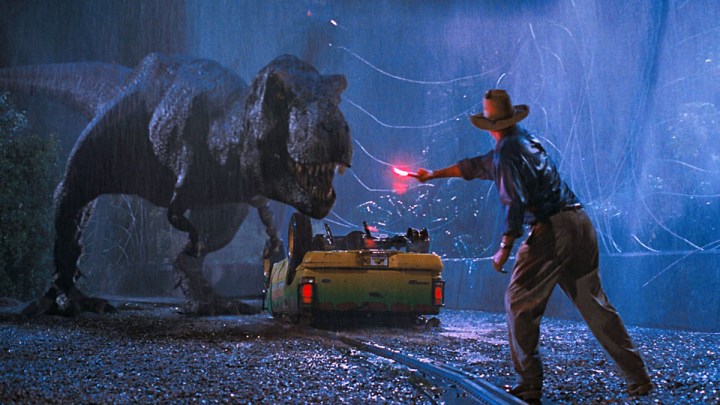
With 2022’s Jurassic World Dominion, the Jurassic Park franchise is at an end as we know it. However, knowing the cyclical nature of Hollywood, there’s sure to be a reboot or reprisal, of sorts, somewhere down the line. Still, Dominion effectively capped off a three-decade-long journey that placed prehistoric creatures in the modern age. When the Steven Spielberg-directed Jurassic Park hit theaters in 1993, audiences were mesmerized by both the sheer grandeur and hypothetical terror of the semi-scientific thesis behind resurrecting a species that’s been long extinct.
Despite the adaptation of Michael Crichton’s popular novel of the same name which toyed with the philosophies of natural law, chaos, and the ambition of mankind, Jurassic Park entered the halls of cinematic glory for what it truly was – a masterfully entertaining sci-fi extravaganza. The amalgamation of practical and modern CGI effects created a visual delight scientists like the fictional Dr. Alan Grant (Sam Neill) could only dream of. And it turns out, dinosaurs that amaze and terrify were just what audiences wanted. The film raked in the dough, and nearly 30 years later, Universal distributed the sixth film in the Jurassic franchise. Now the question becomes: how does each Jurassic film stack up against the rest?
6. Jurassic World Dominion (2022)
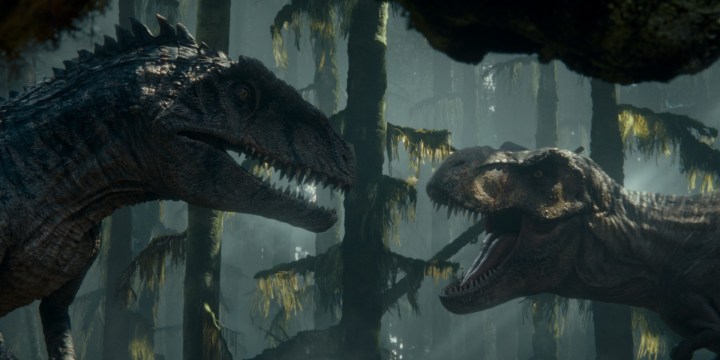
Sam Neill, Laura Dern, Jeff Goldblum, and the Giganatosaurus couldn’t save this fizzling closer to the Jurassic World trilogy. Despite the filmmakers literally “going big” with this action adventure, Dominion left plenty to be desired when it came to its hollow story. That’s not to say that it’s not entertaining, though. But there are two elements that ultimately make the Jurassic franchise the winning saga that it is: dinosaurs and thought-provoking science or ethical philosophy. Most of the films’ story arcs were heavily invested in these two pillars of the franchise. Dominion left both by the wayside.
Make no mistake, dinosaurs are everywhere in Dominion. The problem is that the narrative hardly concerns them. Instead of taking the most sensible route of showing audiences the calamity that’d ensue in the modern world with dinosaurs flourishing as an invasive species, the writers chose to inject a cliché villain bent on greed who oversaw the genetic engineering of monstrous locusts that he uses to ravage the world’s crops with the intent on holding the world’s food supply hostage. It was a sinister plot that Laura Dern’s Ellie Sattler pieced together in the space of five minutes at the start of the film just by investigating a farm afflicted by the beastly locusts and asking a few questions. Dominion is, unfortunately, a waste of an all-star cast and the groundwork laid before it.
5. Jurassic Park III (2001)
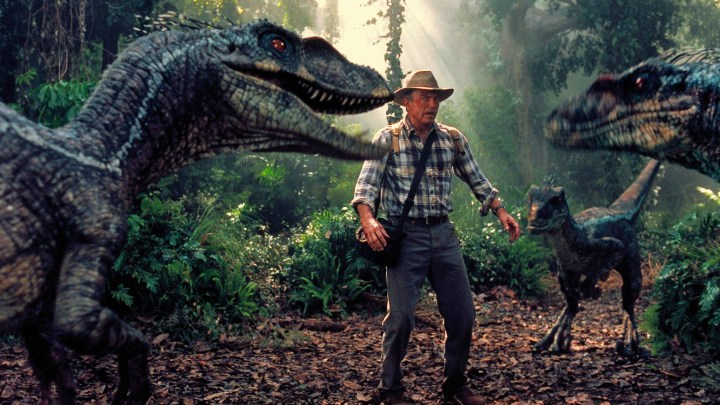
This 2001 film saw the return of Dr. Alan Grant after being absent from the original sequel, The Lost World. The story of Jurassic Park III almost fills like a filler episode in a TV series. The film follows a young boy by the name of Eric Kirby (Trevor Morgan) who goes missing on Isla Sorna after a parasailing excursion gone wrong. While in the air and traveling through fog, the crew of the boat are seemingly killed by an unseen force causing Eric and his mother’s boyfriend, to detach from the line and glide ashore. Already, we’re entering preposterous territory with implied ninja-like dinosaurs that boarded the boat, killed the crew, and disembarked before Eric and his pal could see what was happening.
Eric’s parents, Paul (William H. Macy) and Amanda Kirby (Tea Leoni), con Dr. Grant into taking them on a tour of the island strictly from the safety of an airplane. Of course, they lied. The pair land the airplane to search for their son, dinosaurs attack, and all hell breaks loose. As the crew travels the island, the disposable security detail gets picked off one by one. The real threat is a Spinosaurus which handily defeats a T-Rex in the first moments on the island, highly intelligent raptors, and pterodactyls. The entire affair is simply a bid for survival among a group of humans making extremely poor choices. Dr. Grant is literally the only individual with any sense. If you want to see Dr. Grant talk to raptors with a 3D-printed mold of a raptor’s larynx, witness a raptor actually speak to Grant in his dreams, or come to grips with the idea that carnivorous dinos snap more necks than a burly hero in an ‘80s action film, Jurassic Park III might be for you.
4. Jurassic World: Fallen Kingdom (2018)
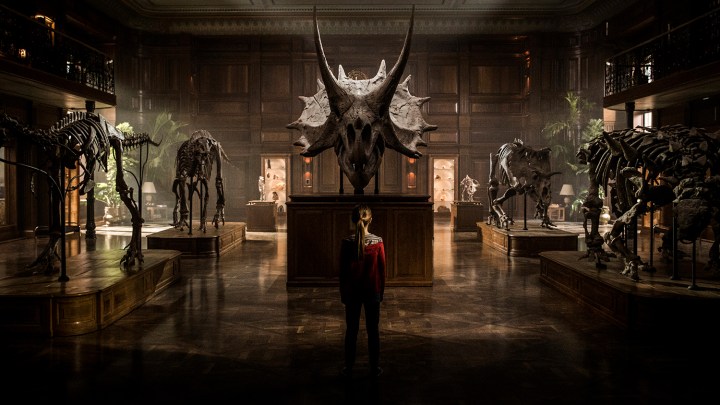
Years after the massacre at Jurassic World on Isla Nublar, Claire Dearing (Bryce Dallas Howard) has shifted from an eccentric capitalist to a wildlife activist. A volcano on Isla Nublar has become active and threatens to re-extinct the remaining dinosaurs on the island. And if you’re wondering about Isla Sorna, the major island from The Lost World and Jurassic Park III, you’d have to read online marketing materials for Fallen Kingdom to learn that the dinosaurs were removed from the island to populate the Jurassic World park on Isla Nublar. We also learn that John Hammond (Richard Attenborough) apparently had a partner in crime when resurrecting dinosaurs from the dead. Benjamin Lockwood (Succession‘s James Cromwell) invites Claire and Owen Grady (Chris Pratt) to help rescue the dinosaurs from becoming extinct once again.
Of course, there’s another conspiring actor in their midst who is actually using Lockwood’s resources to obtain the dinosaurs and auction them off to the highest bidder. The film does tackle a few interesting topics. In particular, Fallen Kingdom depicts a very public debate over whether the federal government should expend resources to save a species that was already extinct once due to natural selection. Furthermore, Lockwood was cast aside by Hammond because he cloned his own deceased daughter. Whatever you might think concerning these topics, Fallen Kingdom does challenge these ideas from multiple angles. Even still, the bulk of the storyline is riddled with glaring plot holes. Mostly, it’s a wonder that local and state resources couldn’t be deployed to hunt or detain the escaped dinosaurs. After all, they’d be a threat to the public.
3. The Lost World: Jurassic Park (1997)
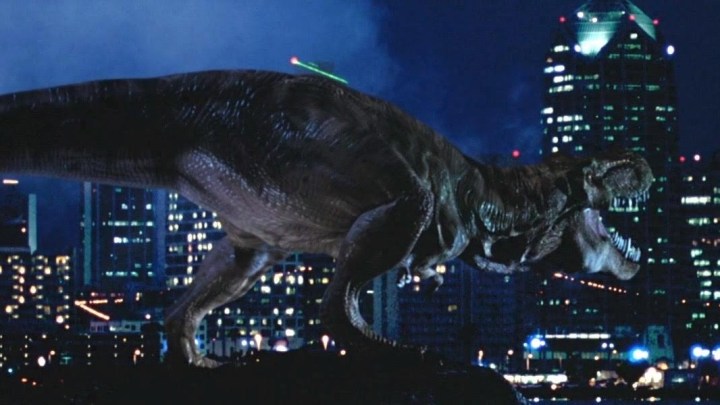
Spielberg returned to direct the sequel to the original film. Crichton, an author not typically big on writing sequels, penned a sequel novel for the sake of another film adaptation. Despite his efforts, however, Spielberg and the screenwriters only used some elements of the book while largely chartering their own course with this film. The Lost World takes place four years after the events of the original film in which Dr. Ian Malcom (Jeff Goldblum) returns in an effort to retrieve his girlfriend, Dr. Sarah Harding (Julianne Moore), from a second island filled with dinosaurs living free of fences or containment. She’s set on documenting the animals while Ian is focused on surviving the same horror he experienced years ago. Meanwhile, John Hammond’s (Richard Attenborough) nephew, Peter Ludlow (Arliss Howard) has wrestled control of Ingen from him and is set on capturing dinos to bring to a mainland theme park. Clearly, he learned nothing from his uncle’s experience and is focused on those dollar signs.
The film’s science-based theme shifted from the already-tread territory of genetic recreation of prehistoric creatures to a study of how the animals may have behaved in a natural setting. Extra attention was given to the Tyrannosaurs and their plight as protective parents. Of course, this invading human element stirred up plenty of trouble on screen. However, there was plenty of opportunity for competing theories in the paleontology community to be shoe-horned into the film’s dialogue. The film, of course, ends in a bombastic way as the T-Rex rampages through San Diego like Godzilla. Ultimately, The Lost World made big money at the box office but wasn’t received as from a critical perspective as its predecessor.
2. Jurassic World (2015)
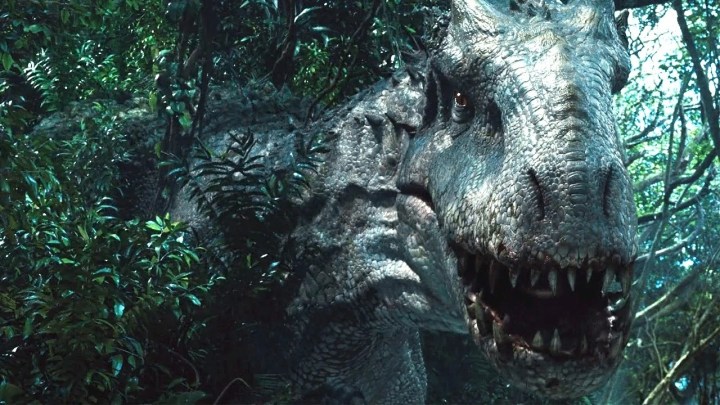
Over a decade after the release of Jurassic Park III in theaters, Director Colin Trevorrow’s vision for a return to the franchise is fully realized with the blessing of Steven Spielberg. Jurassic World acted as a soft reboot to the narrative. While the narrative kept the original film top of mind, it focused on a new park created in the wake of the original park’s failure. John Hammond has since passed away, but his vision has now truly come to pass. A theme park featuring dinosaurs as the main attraction is open to the public and operating smoothly – that is, until commercial interests and reckless, ego-driven science collide. Owen Grady (Guardians of the Galaxy Vol. 3‘s Chris Pratt), a raptor handler, and Claire Dearing (Bryce Dallas Howard), the operations manager of the park, are newcomers to the franchise. They ultimately find themselves scrambling to survive the day when the Indominus Rex, a terrifying genetic concoction cooked up by geneticist Dr. Henry Wu (BD Wong), threatens to bring the park to its knees and eat its patrons for lunch.
Ultimately, the film acted as a cautionary tale emblematic of overzealous corporate ambition. Claire Dearing indicates that the public simply isn’t fascinated by ordinary dinosaurs any longer and the demand for something fresh is what drives their operation. It’s a stark reminder that humans often take the natural world for granted in the pursuit of more. Furthermore, the devastation wreaked by the Indominus Rex is not just a product of its creation, but also its captivity – a life that has destroyed its natural instincts. The film is rife with subtext and commentary that ultimately buoy the action and spectacle unfolding on screen. Jurassic World was a true return to form for the franchise.
1. Jurassic Park (1993)
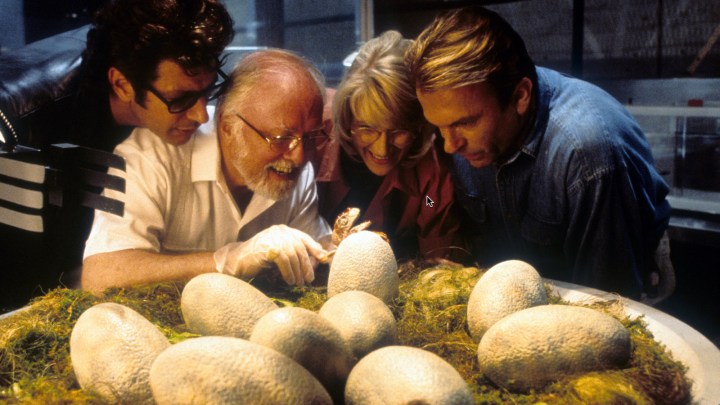
It goes without saying that the original 1993 film that started it all is the pinnacle of dinosaur media entertainment. This is, in large part, due to the fact that the concept was unique and the movie magic behind the dinosaurs’ creation was top-notch and still holds up to this day. Jurassic Park is, essentially, lightning in a bottle, and they say that lightning never strikes the same place twice. While the Jurassic series enjoyed good fortune for six films monetarily, no continuance of the property will ever reach the level of adoration the public and critics alike have for Jurassic Park.
Crichton’s novel and, subsequently, the film adaptation wasn’t just an exploration of the scientific possibility of resurrecting extinct creatures from the dead, it also probed mankind’s drive for control in the face of the natural world – a truly overwhelming force. “Your scientists were so preoccupied with whether or not they could, they didn’t stop to think if they should,” Ian Malcolm poignantly suggests. It’s a line that ultimately encompasses the theme of the entire narrative. Jurassic Park wasn’t just a creature feature for children and families, it was a thought experiment. While it entertained, its propositions continue to live in our heads long after the credits roll.
Editors’ Recommendations
Services Marketplace – Listings, Bookings & Reviews